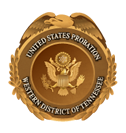The Western District of Tennessee recognizes the importance of community reintegration for offenders transitioning to or living in the community. Our district has implemented programs that begin with the pre-release stage of supervision to assist with this transition. The most important aspects of successful supervision involve maintaining a stable residence, obtaining employment, and developing a positive support system.
Prior to an offender’s release, U.S. Probation Officers initiate contact with that individual either through the institution where he/she is housed or at the residential re-entry center. Our JumpStart program provides an overview of what the individual should expect while on supervision. The presentation given by the officers is designed to motivate the offender to succeed on supervision. It offers advice for overcoming the common barriers experienced by those recently released including substance abuse, employment, and transportation. The information given and garnered allows offenders and officers to begin a reentry plan that provides a realistic approach to the offender’s success. Additionally, collateral contact is established with family members or those who will play an integral part in the offender’s reentry.
In January 2011, our Reentry and Drug Courts held their first sessions. The purpose of these courts is to address targeted criminogenic tendencies associated with family and peer associations, substance abuse, employment, value systems and education/vocation skills. Specific to the drug court, offenders are asked to identify and manage situations that may trigger drug use as well as other criminal behaviors. Offenders who voluntarily participate in either of the programs are given advanced access to community resources, and employment opportunities. The direct involvement of our district and magistrate judges allows offenders to view the judicial system in a more humanitarian vein while also providing an additional layer of support and encouragement through the most challenging period of post-release. For those who complete the program, there is the consideration for an early termination of supervision.
Our district has adopted the use of the cognitive behavioral program developed by Gregory Little, Ed.D. and Kenneth Robinson, Ed.D. The Moral Reconation Therapy (MRT) program combines group exercises and structured activities in a systematic step program designed to facilitate the development of increase moral cognitions. U.S. Probation Officers are certified as facilitators for the program. The utilization of this program has produced lasting positive outcomes on behavior where punishment has not.
Through these reentry services we hope to further our commitment to excellence by providing those we service with the tools necessary to make a permanent lifestyle change that will benefit themselves and the community.
